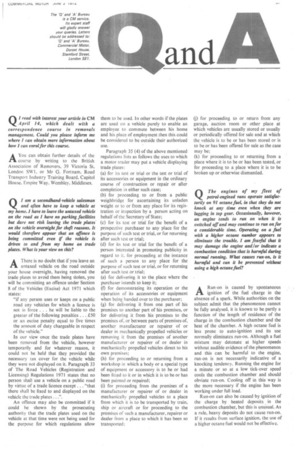( I The engines of my fleet of petrotengined vans operate
Page 89

If you've noticed an error in this article please click here to report it so we can fix it.
sadsfactorn.), on 91 octane fuel, in that they do not knock at any time even when they are lugging in top gear. Occasionally, however, an engine tends to run on when it is switched off and may continue to run on for a considerable time. Operating on a fuel with a higher octane number appears to eliminate the trouble. I am fewful that it may damage the engine and/or indicate a combustion condition that is harmful during normal running. What causes run-on, is it harmful and can it be prevented without using a high octane fuel?
ARun-on is caused by spontaneous ignition of the fuel charge in the absence of a spark. While authorities on the subject admit that the phenomenon cannot be fully analysed, it is known to be partly a function of the length of residence of the charge in the combustion chamber and the heat of the chamber. A high octane fuel is less prone to auto-ignition and its use normally eliminates run-on. Although a fuel mixture may detonate at higher speeds without audible evidence of the phenomenon and this can be harmful to the engine, run-on is not necessarily indicative of a knocking tendency. Running the engine for a minute or so at a low tick-over speed cools the combustion chamber and should obviate run-on. Cooling off in this way is the more necessary if the engine has been working under full load.
Run-on can also be caused by ignition of the charge by heated deposits in the combustion chamber, but this is unusual. As a rule, heavy deposits do not cause run-on. If it results from surface ignition, the use of a higher octane fuel would not be effective.
















































































































































